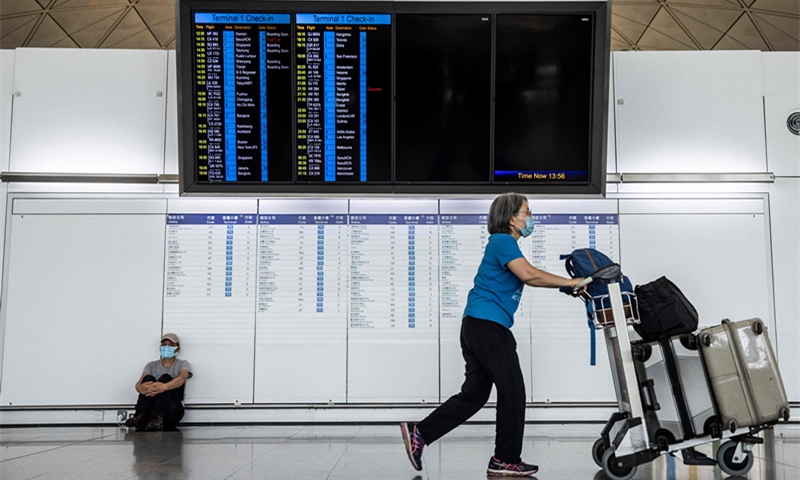
An electronic sign displays flight schedules at Hong Kong International Airport on September 23, 2022. Hong Kong announced on September 23 it will end mandatory hotel quarantine. Photo: VCG
The Hong Kong Special Administrative Region (SAR) announced the loosening of COVID-19 quarantine measures from next Monday, meaning no hotel quarantine but only a 3-day self-monitoring period at home is needed for arrivals, ending the hotel quarantine policy which has been in place for around two years.
Following the announcement, searches for international flights to Hong Kong increased fourfold on online travel agency platform Qunar. The most searched departure locations included the US, Australia, UK, Canada, Japan, Singapore, Thailand, Russia and Malaysia, according to statistics sent from the platform to the Global Times.
"These new policies from the HKSAR government provide a lot of convenience for us overseas students. We can have more plans and ways to return home," a Chinese mainland student surnamed Ding, who is currently studying in London, told the Global Times on Friday.
Together with the quarantine policies, nucleic acid testing conducted 48 hours before flying to Hong Kong will be replaced with a Rapid Antigen Test before boarding, John Lee, Chief Executive of HKSAR, told a press briefing on Friday.
Cathay Pacific welcomed the HKSAR government's latest measures to facilitate travel to Hong Kong. These adjustments will help boost sentiment for travel, thereby facilitating the gradual resumption of travel activities and strengthening of network connectivity to, from and through the Hong Kong aviation hub, read a statement from Cathay Pacific sent to the Global Times on Friday.
"We intend to add more than 200 pairs of passenger flights in October to both regional and long-haul destinations. While we will continue to add back more flights as quickly as is feasible, it will take time to rebuild our capacity gradually," the airline's statement read.
Ding also expected prices of flight tickets from London to Hong Kong to fall after the frequency of international flights increases.
"Our goal is to make it easier for people to come and they are allowed to go about their activities with maximum possibilities," said Lee.
Upon arrival, a nucleic acid test is required at the airport. After completion, arrivals can leave without waiting for the result. When leaving the airport, people can take any public transport option of their choice. Arrivals will be issued a "yellow code" for three days during which they are allowed to go out and use public transport but cannot enter listed places such as restaurants and bars. On the third day, they will receive the nucleic acid test results. Those who receive a negative result will be issued a "blue code."
The HKSAR will also lift the flight ban on Hong Kong residents who have not been fully vaccinated.
Lee said that the HKSAR government is positive about the direction of the epidemic. The new measures will help to balance risks and economic dynamics, and maintain Hong Kong's competitiveness while controlling risk. The risk of overseas arrivals is no higher than or lower than the risk of local transmission, he added.
Confirmed COVID-19 cases in HKSAR stood at 5,827 on Thursday, down from 10,076 on September 9, according to statistics from the HKSAR government website.
Prior to this latest announcement on Friday, the HKSAR government shortened the 7-day quarantine in hotels to three days starting from August 12, followed by medical surveillance at home for a period of four days.
Global Times




